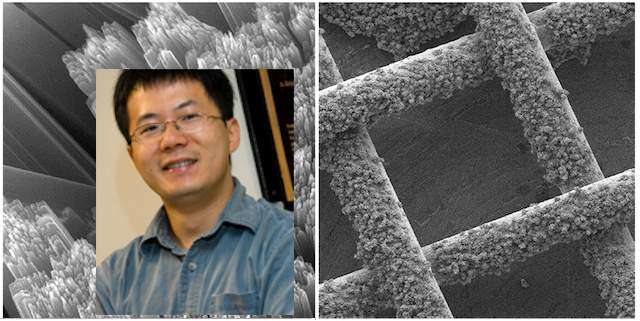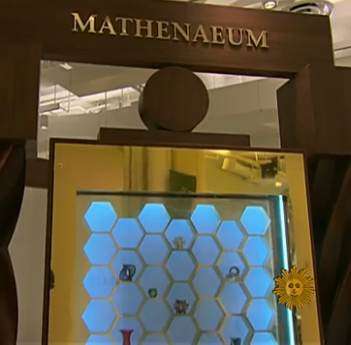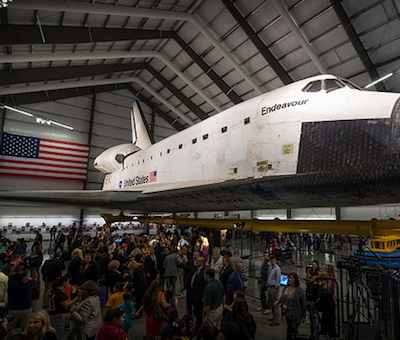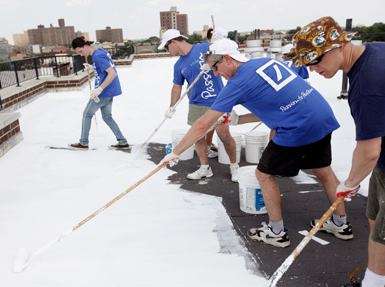OSU Invents "World's First Solar Battery" to Run on Light and Air
Is it a solar cell? Or a rechargeable battery? Actually, the patent-pending device is both. The inventors at Ohio State University call it the world's first solar battery.

Is it a solar cell? Or a rechargeable battery? Actually, the patent-pending device is both. The inventors at Ohio State University call it the world's first solar battery.

Current wireless networks have a problem: The more popular they become, the slower they are. Researchers at Fudan University in Shanghai have just become the latest to demonstrate a technology that transmits data as light instead of radio waves, which gets around the congestion issue and could be ten times faster than traditional Wi-Fi.

Math. The very word conjures painful memories: long division . . . Square roots. Take that unpopular academic subject, a dedicated visionary, and $23 three million, and what have you got? Glen Whitney's Museum of Mathematics (MoMath for short) which opened December in New York City.

A 10-year-old boy was moved to tears when he saw the Space Shuttle Endeavour fly over his school on its way to its new home at the California Science Center and even more excited when he could walk around the gargantuan space craft at the museum, touching the tires that flew in space. Suddenly he saw the possibilities of a career in math, science, technology and engineering.

On the hottest day of the summer last year in New York City, a white roof was measured to be 42 degrees (F) cooler than the traditional black roof it was being compared to by NASA scientists studying the city's unprecedented effort to brighten rooftops and cool down the city.
Scientists have reversed paralysis in dogs after injecting them with cells grown from the lining of their nose. The Cambridge University team is cautiously optimistic the technique could eventually have a role in the treatment of human patients.
A cure for arthritis may be coming soon thanks to a breakthrough in stem cell research from the University of Manchester.
Archaeologists have long held that North America remained unpopulated until about 15,000 years ago, when Siberian people walked or boated into Alaska and then moved down the West Coast. But a dark, tapered stone blade, found near the mouth of the Chesapeake Bay, turned out to be 22,000 years old, suggesting that its makers probably paddled from Europe and arrived in America thousands of years ahead of the western migration.
The Smithsonian launched a crowdfunding campaign to save the spacesuit Neil Armstrong wore on the first moon walk and donations have skyrocketed.
A trainee surgeon, who is also a self-confessed 'technology geek,' has figured out a way to save the U.K. National Health program a lot of money by taking advantage of 3D-printer technology.
High School seniors Miranda Wang and Jeanny Yao want to continue pursuing a solution for how to make plastic decompose using natural bacteria already evolving on the planet. The two were finalists for Canada's top student biotechnology award, the 2012 Sanofi BioGENEius Challenge, where their project was judged to have the greatest commercial potential of any project entry, valued at $10 million. Now they are bringing their ideas to the TED stage.
Researchers studying a rare and endangered species of penguin have uncovered a previously unknown species that disappeared about 500 years ago.
U.S. scientists have designed a process to create a material capable of strongly repelling oils, one they said could have applications in hazardous waste cleanup.
A ray of hope has dawned in the lives -- and health care -- of many Ugandans, after the construction of an ultra-modern medical facility in Uganda, largely due to generosity of an American scientist and businessman.
Two theoretical physicists who suggested that an invisible ocean of energy suffusing space is responsible for the mass and diversity of the particles in the universe won the Nobel Prize in Physics on Tuesday morning. The theory, elucidated in 1964 by Peter Higgs, 84, of the University of Edinburgh in Scotland, and François Englert, 80, of the University Libre de Bruxelles in Belgium, sent physicists on a generation-long search for the Higgs boson (also referred to as the God particle).
President Obama and a former astronaut have both invited a teen to science events after his electronics project frightened teachers at his school.
Alabama schools are updating science standards, including once controversial topics and focusing on more hands-on work for students.
Robot fish developed by British scientists are to be released into the sea off north Spain to detect pollution. The team hopes to use the five-foot-long robotic fish to find pollution in rivers, lakes and seas across the world.
Everyone in the UK is being asked to clear out their drawers, wardrobes and cupboards - and take their excess clothing and accessories to the clothing retail chain TK Maxx anytime in April, to contribute towards the fight against kids' cancer. Since 2004, the annual campaign, Give up Clothes for Good, has raised a whopping £10 million, with hopes this year to raise an additional £2.5 million for Cancer Research UK.
Nine patients received new kidneys from nine living donors in a record-setting, 36-hour transplant session in San Francisco using two hospitals.
Recent Stories
A Heartfelt Reminder to Appreciate the Ones We Love
Cherish the Woman Who Stands by You
Breaking Generational Cycles of Pain
Living by Your Own Values, Not Others' Approval
When Life Brings Rain, It’s Okay to Rest
Before You Judge Someone's Life, Take a Moment to Walk in Their Shoes.
A Friend Who Spreads Gossip is Not a True Friend at All
The Value of Human Connection Over Digital Convenience
The Quiet Kind of Love
One Day, Your Mom Won’t Call You Anymore
I’ve reached a point in my life...
Happiness is a mindset, a conscious choice we make every day